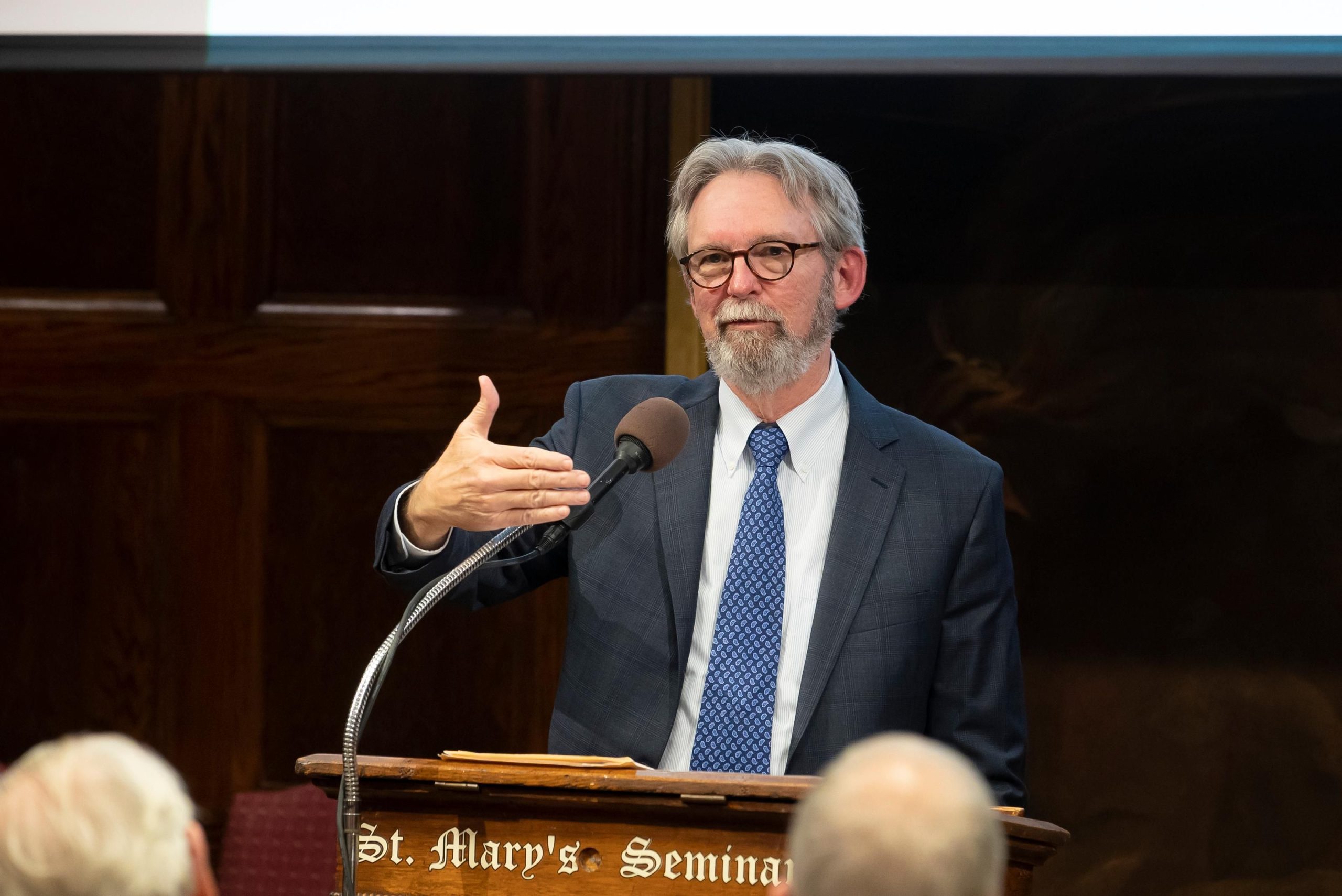Richard Hays

Biography and cause of death of Richard Hays
Richard Bevan Hays (May 4, 1948 – January 3, 2025) Richard Hays was an American New Testament scholar and George Washington Ivey Professor Emeritus of New Testament Duke Divinity School in Durham, North Carolina. He was an ordained minister in the United Methodist Church. Hays died on January 3, 2025, at the age of 76.
Richard Hays Education and career
Hays received his Bachelor of Arts degree in English literature from Yale College, his Master of Divinity degree from Yale Divinity School, and his Doctor of Philosophy degree from Emory University.
Hays returned to Yale Divinity School as an Assistant Professor of New Testament in 1981 and taught there until 1991, when he moved to Duke Divinity School. He was named George Washington Ivey Professor of New Testament in 2002. In 2010, he became Dean of the Divinity School. He stepped down from the role of Dean in 2015 and went on medical leave following a diagnosis of pancreatic cancer. After successful treatment, he was able to return to teaching, and retired in 2018.
Richard Hays Scholarship
Hays was considered one of the world’s leading New Testament scholars, with Stanley Hauerwas writing “There are few people I would rather read for the actual exposition of the New Testament than Richard Hays.” Hays’ work focused on New Testament theology and ethics, the Pauline epistles, and early Christian interpretation of the Old Testament.
In the field of New Testament studies, Hays was often identified with figures such as N. T. Wright[citation needed] and Luke Timothy Johnson. Some of Hays’ studies surrounded the narrative interpretation of Scripture, the New Testament’s use of the Old Testament, the subjective genitive reading of pistis Christou (“faith(fulness) of Christ”) in Paul, and the role of community in the New Testament.
Hays was well known for his criticisms of the Jesus Seminar and the modern Historical Jesus movement. Hays was also vocal about his criticisms of Dan Brown’s best-selling The Da Vinci Code for its controversial historical claims.
Christianity Today named Hays’s book Moral Vision of the New Testament one of the top 100 most important religious books of the 20th century. As a theologically conservative Methodist, throughout the course of his career remained committed to his Wesleyan roots in emphasizing the importance of charity and friendship in the Christian life. Moreover, Hays was a committed pacifist. He made his position clear in The Moral Vision of the New Testament, in which he argued that Jesus Christ taught his disciples to be non-violent.
Hays and his son, Christopher, published a new book, The Widening of God’s Mercy, “a fresh, deeply biblical account of God’s expanding grace and mercy, tracing how the Bible’s narrative points to the full inclusion of LGBTQ people in Christian communities,” which “closes with Richard Hays’s epilogue reflecting on his own change of heart and mind.” He and his son Christopher were interviewed about the book and its genesis on All Things Considered.
In 2008, a Festschrift was published in his honor. The Word Leaps the Gap: Essays on Scripture and Theology in Honor of Richard B. Hays included contributions from Stanley Hauerwas, E. P. Sanders, James D. G. Dunn, Francis Watson, N. T. Wright, and Ellen F. Davis.
Richard Hays Selected works
Hays Books
Hays, Richard B. (1989). Echoes of Scripture in the Letters of Paul. New Haven, CT: Yale University Press.
(1996). The Moral Vision of the New Testament: Community, Cross, New Creation. San Francisco, CA: HarperSanFrancisco.
(1997). First Corinthians. Interpretation. Louisville, KT: Westminster, John Knox Press.
(1998). New Testament Ethics: the story retold. J. J. Thiessen lectures. Vol. 1997. Winnipeg, OT: CMBC Publications.
(2002). The Faith of Jesus Christ: The Narrative Substructure of Galatians 3:1-4:11 (2nd ed.). Grand Rapids, MI: Eerdmans.
(2005). The Conversion of the Imagination: Paul as Interpreter of Israel’s Scripture. Grand Rapids, MI: Eerdmans.
(2014). Reading Backwards: figural Christology and the fourfold gospel witness. London: SPCK Publishing.
(2016). Echoes of Scripture in the Gospels. Baylor University Press.
(2020). Reading with the Grain of Scripture. Grand Rapids, MI: Eerdmans.
(2024). The Widening of God’s Mercy: Sexuality Within the Biblical Story. New Haven, CT: Yale University Press.
Richard Hays Edited by
Davis, Ellen F., eds. (2003). The Art of Reading Scripture. Grand Rapids, MI: Eerdmans.
Alkier, Stefan, eds. (2005). Die Bibel im Dialog der Schriften: Konzepte intertextueller Bibellektuere. Tübingen/Basel: Francke.
Gaventa, Beverly Roberts, eds. (2008). Seeking the Identity of Jesus: A Pilgrimage. Grand Rapids, MI: Eerdmans.
Alkier, Stefan; Huizenga, Leroy Andrew, eds. (2009). Reading the Bible intertextually. Waco, TX: Baylor University Press.
Perrin, Nicholas, eds. (2011). Jesus, Paul and the People of God: A Theological Dialogue with N. T. Wright. Downers Grove, IL: IVP Academic.
Alkier, Stefan, eds. (2012). Revelation and the Politics of Apocalyptic Interpretation. Waco, TX: Baylor University Press.
Richard Hays Chapters
(2003). “Reading Scripture in Light of the Resurrection”. In; Davis, Ellen F. (eds.). The Art of Reading Scripture. Grand Rapids, MI: Eerdmans. pp. 216–38. ISBN 9780802812698.
(2008). “The Story of God’s Son: The identity of Jesus in the letters of Paul”. In; Gaventa, Beverly Roberts (eds.). Seeking the Identity of Jesus: A Pilgrimage. Grand Rapids, MI: Eerdmans. pp. 180–99.
(2009). “The Liberation of Israel in Luke-Acts: intertextual narration as countercultural practice”. In; Alkier, Stefan; Huizenga, Leroy Andrew (eds.). Reading the Bible intertextually. Waco, TX: Baylor University Press.
(2012). “Faithful Witness, Alpha and Omega: the identity of Jesus in the Apocalypse of John”. In; Alkier, Stefan (eds.). Revelation and the Politics of Apocalyptic Interpretation. Waco, TX: Baylor University Press.
Richard Hays Journal articles
(1999). “The Conversion of the Imagination: Scripture and Eschatology in 1 Corinthians”. New Testament Studies.
(2007). “Reading the Bible with Eyes of Faith: The Practice of Theological Exegesis”. Journal of Theological Interpretation.
Source: Wikipedia

